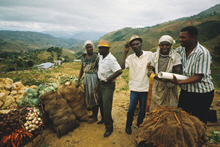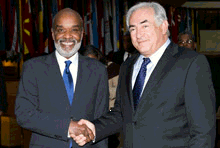
Typical street scene in Santa Ana, El Salvador. (Photo: iStock)
IMF Survey: Haiti Gets $36 Million in New IMF Financing
February 13, 2009
- Series of natural disasters in Haiti causes unprecedented economic losses
- World economic crisis compounds impact of disasters
- Additional donor support needed to help fill Haiti's financing gap
The IMF's Executive Board has approved a $36.6 million increase in balance of payments support for Haiti to counter the negative impact of external shocks caused by a series of devastating hurricanes in 2008 as well as the global economic crisis.

Food prices remain high in Haiti, with distribution networks and much of last year's harvest damaged by hurricanes (photo: Bettmann/Corbis).
LOW-INCOME COUNTRIES
The augmentation of financial assistance—which was granted following the fourth review of Haiti's economic performance under the IMF's Poverty Reduction and Growth Facility—will allow the Caribbean nation of nearly 9 million people to receive an immediate disbursement of about $35.8 million. This latest sum comes on top of a previous augmentation of $26 million received in June 2008 in response to high world food and fuel prices.
The new IMF assistance was announced one week after Haitian President René Préval visited the IMF's headquarters to discuss the country's emergency financing needs with IMF Managing Director Dominique Strauss-Kahn.
"The political and social situation remains fragile, the impact of weather-related shocks lingers on, and the global downturn is expected to negatively affect remittances and exports," said IMF Deputy Managing Director Takatoshi Kato in a statement following the Board meeting.
Harsh hurricane season
Haiti's current economic straits can be blamed partly on the series of severe shocks that have wreaked havoc on the country in the past year. Like much of the world, the country was hit by sharply rising food and fuel prices in the first half of 2008. Then, beginning in mid-August, the country suffered the impact of tropical storm Fay and hurricanes Gustav, Hanna, and Ike. The storms, which came in rapid succession, caused extensive flooding and resulted in damages estimated at about US$900 million, or 15 percent of the country's GDP.

René Préval, President of Haiti, with IMF Managing Director Dominique Strauss-Kahn (IMF photo).
The hurricanes inflicted considerable damage on the country's agriculture, housing, and transportation infrastructure. The country's food security situation also worsened, with 3.3 million people now estimated to be in a precarious position.
The international financial crisis now represents another shock in the making for this fragile economy, mainly through lower export demand and lower remittances. Haiti's export sector is relatively small, but a significant share of the population is highly dependent on remittances.
And although international food and fuel prices have eased in recent months, food prices and import needs are still high, with distribution networks impaired by the hurricanes and 60 percent of the autumn harvest destroyed.
Mobilizing additional aid
The recent shocks serve to compound the economic difficulties of Haiti, the poorest country in the Western Hemisphere. To discuss the priorities for the country's recovery, the Inter-American Development Bank will host a donor conference in Washington on April 13-14. The conference will aim at improving donor coordination and maximizing aid effectiveness. It will also invite support from new donors outside of Haiti's traditional donor base and encourage existing partners to increase their contributions to the country.
"Additional donor support to finance Haiti's poverty reduction priorities and reconstruction would be essential to alleviate the government's spending pressures and maintain political and social cohesion," said Corinne Deléchat, the IMF's mission chief for Haiti.
Comments on this article should be sent to imfsurvey@imf.org


